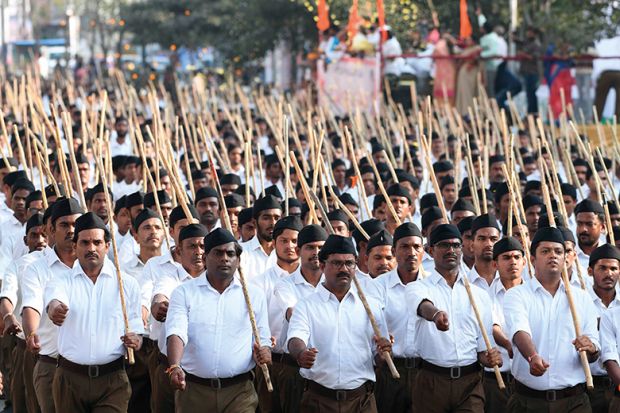Censorship fears related to Hindu nationalism, or “Hindutva”, have driven US-based academics to mobilise into a new activist group and organise a major academic conference.
The South Asia Scholar Activist Collective (SASAC) launched in July with founding members from at least eight US universities. Its first action was to publish a “Hindutva Harassment Field Manual” to help those who have been targeted by the Hindu right wing and also as a resource for university staff or management who want to learn about the issue.
SASAC’s materials list various threats, the most dramatic of which came in 2020 to Vinayak Chaturvedi, an associate professor at the University of California, Irvine. His parents, who have been threatened before because of their son’s research, were victims of a “swatting”, a type of harassment in which a hoax call is made to police that results in armed SWAT officers being dispatched to a person’s home.
Female academics writing about South Asian politics have also reported receiving death threats, rape threats and threats to end or disrupt their employment.
These topics will be discussed from 10 to 12 September in “Dismantling Global Hindutva”, a conference backed by more than 40 institutions, including Harvard University, Stanford University, the University of Chicago and the University of California, Berkeley.
SASAC hopes the conference will draw attention to what it calls “a form of hate little known in most of North America, distinct from the Hindu faith”. The group adds that academic freedom concerns might hinder transnational research and events, especially as India tries to internationalise its higher education system.
There have been concerns about the effects of Hindutva in the West for years, including a warning from a University of Cambridge scholar in 2016. However, the issue seems to have come to the fore in recent months.
Purnima Dhavan, an associate professor of history at the University of Washington-Seattle, and one of the founding members of SASAC, told Times Higher Education that “attacks on individual scholars often attract media attention briefly, or generate petition attempts…but the larger history, funding and coordinated attacks by Hindutva groups has not really been discussed much”.
“There has also been an uptick in personal threats, verbal and physical, to scholars in South Asian studies worldwide,” she added.
One common misconception equates Hindutva (a right-wing or nationalist ideology) with Hinduism (India’s majority religion), Hindus (a people) and Hindi (a language).
“Hindutva groups claim to speak for all Indians − and more specifically for Hindus. This is highly problematic since both groups contain very diverse communities with a multiplicity of beliefs and practices,” Professor Dhavan said.
This distinction is often lost in the context of Western political correctness, where “Asians” can be lumped together into a minority group.
Dheepa Sundaram, an assistant professor of religious studies at the University of Denver, and another founding member of SASAC, told THE: “Hindutva, or Hindu nationalism, and even Hinduism, is not well understood in many American contexts. Trying to explain to scholars who don’t work on South Asia – administrators, deans, provosts – what is going on with this kind of hate is difficult given the lack of contextual knowledge.”
The interviewees for this article said some Hindutva organisations deliberately blurred the line between anti-Indian discrimination in the West and critical discourse about India – in particular, study of its ethnic minorities or disadvantaged classes.
Some scholars have taken precautions to protect themselves. For example, one interviewee took part in a panel at the University of Wisconsin that could not be recorded because a Kashmiri Muslim speaker “feared reprisals against the subjects of her work as well as her family in India”. This scholar might not be able to participate in a follow-up project because her home in India has already been raided by the police.
“The fear is real and palpable,” Professor Sundaram said.
In July, an Indian university pulled out of a webinar after being contacted by the local police, leaving the US co-host, Montclair State University, to proceed without them.
Apoorvanand, a Hindi professor at the University of Delhi and one of the speakers at that event, told THE that “academic freedom has definitely taken a beating across India”.
He cited numerous similar occurrences at colleges, universities and Indian Institutes of Technology (IITs) “in which seminars, talks, film screenings, theatre shows [and] other academic events were either disrupted or disallowed”.
He said he feared that such actions could be a hurdle to future events with foreign partners. “Which academic institution would collaborate with institutions that cannot decide for themselves?” he asked.
Professor Dhavan agreed that these issues could be an obstacle to global study. “Indian scholars are very much a vital part of international research and teaching, but they also confront more restrictions,” she said. “For higher education to grow and maintain quality in any region, academic freedom is vital.”
POSTSCRIPT:
Print headline: Threats from Hindu nationalists spur US academics into action
Register to continue
Why register?
- Registration is free and only takes a moment
- Once registered, you can read 3 articles a month
- Sign up for our newsletter
Subscribe
Or subscribe for unlimited access to:
- Unlimited access to news, views, insights & reviews
- Digital editions
- Digital access to THE’s university and college rankings analysis
Already registered or a current subscriber? Login







